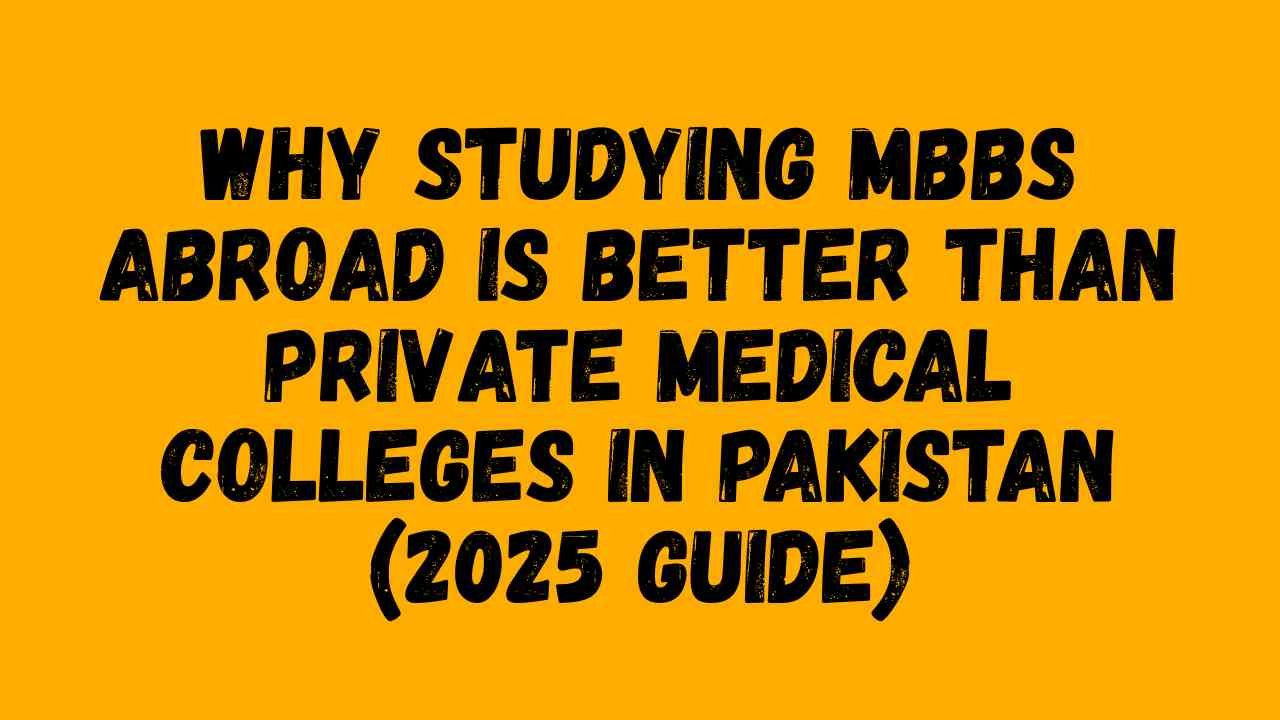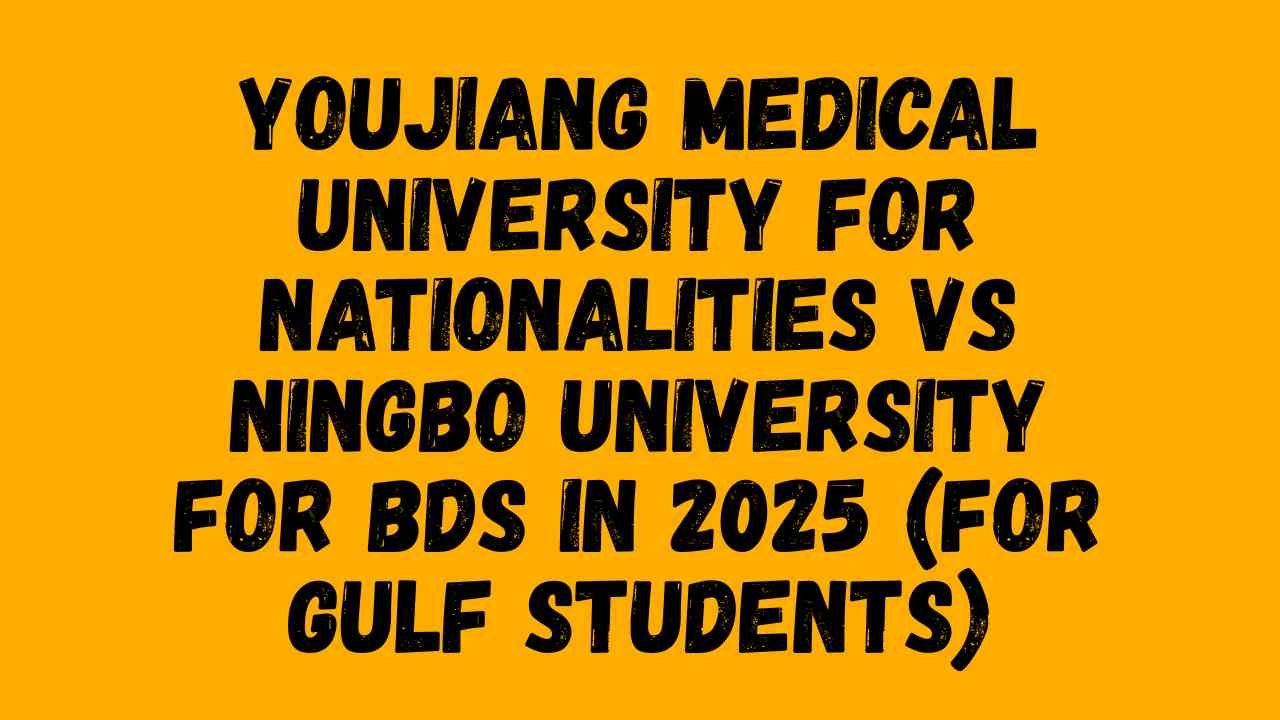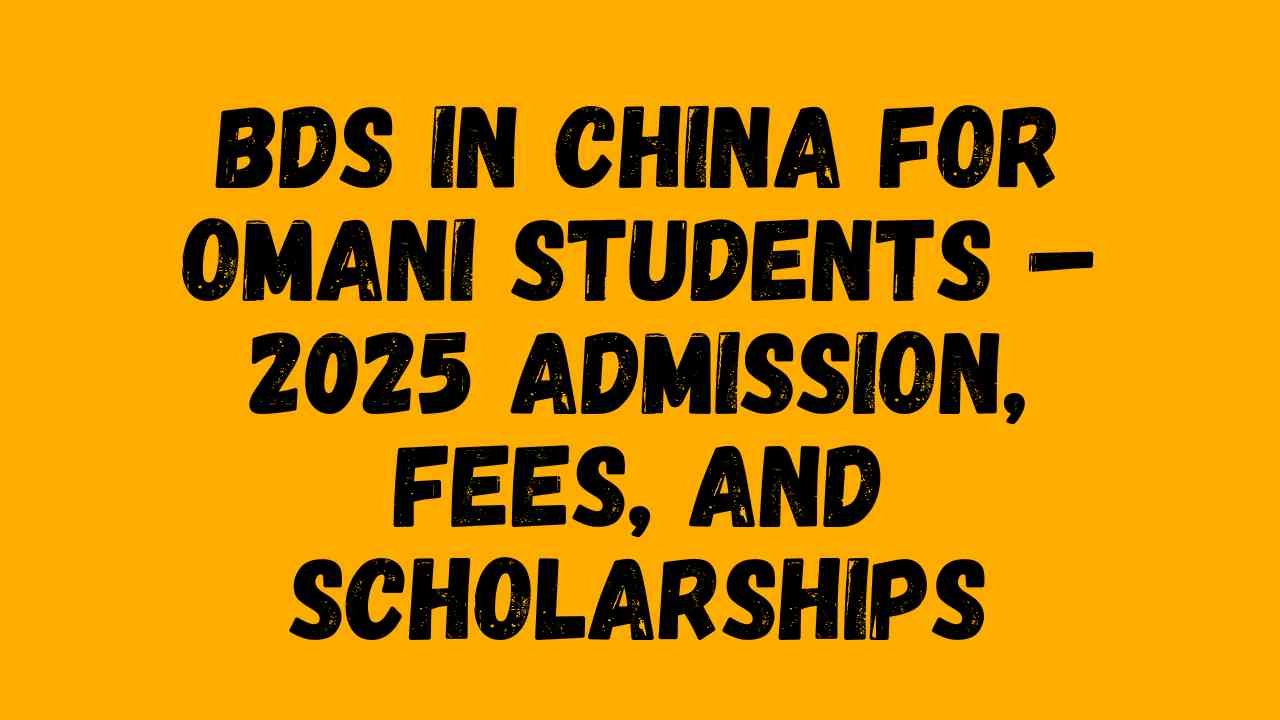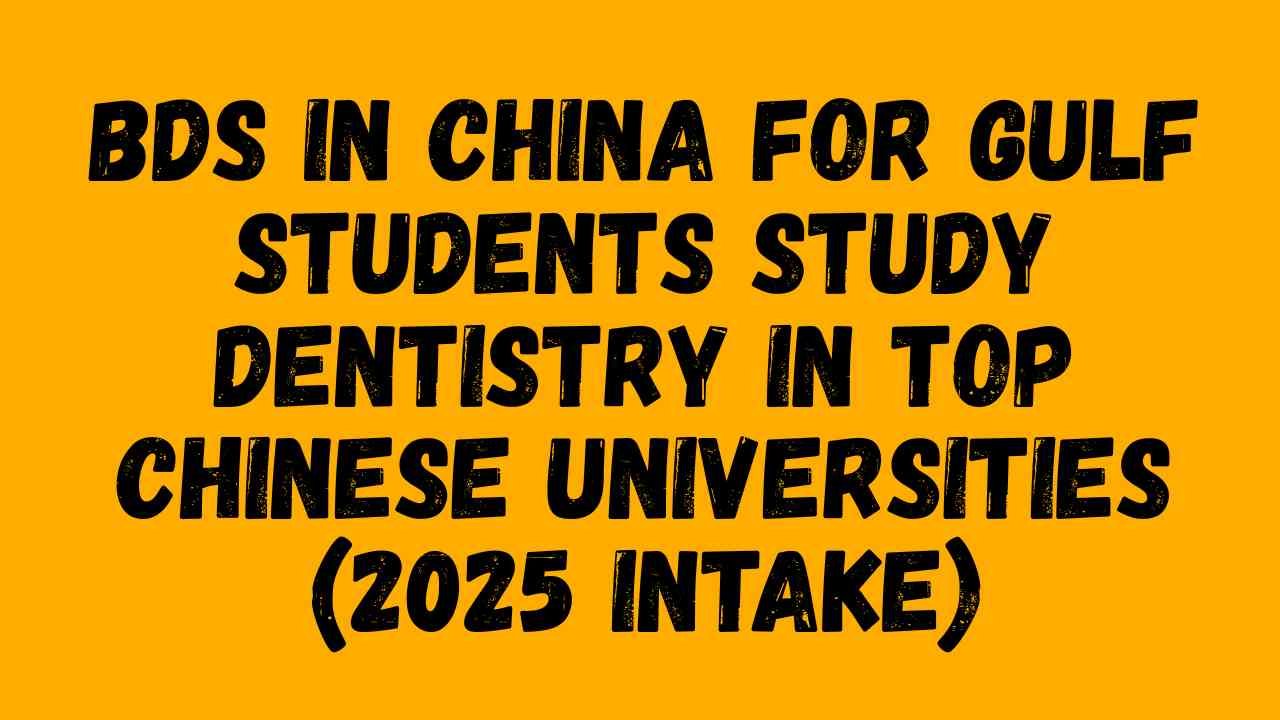Why Studying MBBS Abroad Is Better Than Private Medical Colleges in Pakistan (2025 Guide)
Home > Why Studying MBBS Abroad Is Better Than Private Medical Colleges in Pakistan (2025 Guide)
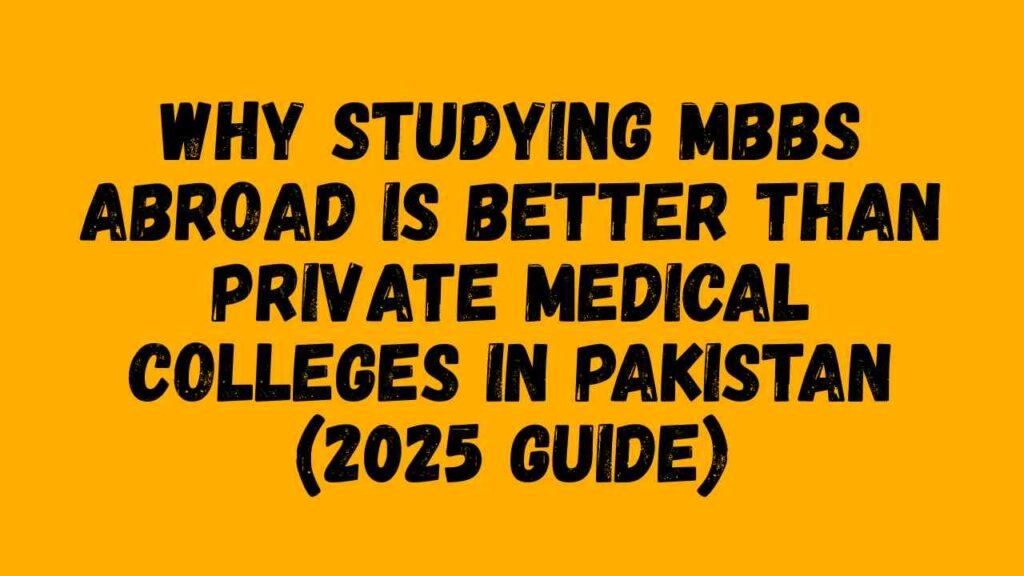
For many Pakistani students, securing admission to medical college is a tough challenge. Every year, thousands of students face challenges securing seats, but due to limited seats, only a few get admission. MBBS abroad for Pakistani students solves these problems by offering affordable tuition fees, international exposure, practical training, and PMDC-approved universities. There are multiple intakes each year available for foreign medical universities. Students prepare for the National Licensing Exam (NLE) in Pakistan, but also open doors to work in Gulf countries or pursue global licensing exams. This guide compares studying MBBS abroad vs Pakistan, focusing on tuition fees, quality of education, global recognition, and career opportunities, helping students and parents make informed decisions.
MBBS Education in Pakistan: The Current Situation
High fees and hidden costs
There are low chances of securing admission in government-sponsored colleges in Pakistan, so students have shifted to private colleges. Those charged tuition fees average approximately 1.8 million PKR. There are many extra payments college collects at every stage, like exam fees, books, supplies, community, rotation, and expenses. Pakistani students often waste their money on costly coaching for MDCAT, which is common and expensive.
Higher Competition
Everyone knows the MBBS is one of the most competitive fields, especially when applying to government medical colleges. More than 4 lakhs students every year apply for MDCAT, but only 7,000 students get a chance. Due to this extreme competition, students face mental stress, waste their year, and lose motivation.
Intense study pressure
The curriculum followed by Pakistani medical colleges is extremely difficult. Everything is theory-based, and students have to memorize the content. The assessments are conducted weekly or monthly, due to strict attendance rules college demands at least 80% attendance. If students fail in any subject, he/she has to repeat the entire year.
Low overseas opportunities
MBBS in Pakistan offers limited global recognition and an outdated curriculum. The outdated curriculum, lack of resources, and lack of exposure create a bad image.
Why More Pakistani Students Are Going Abroad for MBBS
Easy Admission process
Many top-ranking foreign universities do not require any entrance tests and give admission directly based on FSc scores. There are multiple intakes each year for MBBS courses given to unlimited students. Read more about MBBS in China here.
Global career opportunities
Studying abroad gives students the freedom to build medical careers anywhere in the world. Foreign graduates have the right to appear in the National Licensure Exam (NLE). Pakistani students, in large numbers, enroll in higher postgraduate and residency options after completing MBBS abroad.
Global exposure
Studying MBBS abroad gives an international learning environment for Pakistani students. They can interact and develop communication skills, medical perspectives, professional networks, and confidence. Most countries prepare students for global medical licensing exams like NLE, AMC, PLAB, NBE, and USMLE. Top destinations for medical education include: China, Georgia, Russia, Kyrgyzstan, the United Kingdom, and the United States.
Affordability
Abroad countries, including China, Kyrgyzstan, Russia, Ukraine, and Georgia, offer MBBS programs at half the tuition fees of Pakistan. In Pakistan, the cost of studying medicine changes drastically which becomes financial stress for families. Pakistani students can also get benefits from a fully covered scholarship available in large numbers every year for the MBBS program. Check out study options in China for more details.

MBBS Abroad vs Private Medical Colleges: A Detailed Comparison
Features Comparison
| Feature | MBBS in Pakistan | MBBS Abroad |
|---|---|---|
| Duration of Program | Lasts 6 years, including 1 year of house job | Lasts 6 years, including 1 year of clinical internship |
| Language of Instruction | English medium, but mostly communication is in Urdu | Local language & English-taught program, different batches available |
| Admission Requirements | Strict entry test, mainly MDCAT with high FSc scores (Above 80%) | No competitive test required, minimum 60% FSc or equivalent |
| Seat availability | Low | High |
| Intakes | One intake per year | Flexible two intakes: March & September |
| Tuition fees | Approx. 1.8 million PKR, can exceed 1 crore with extra fees | 8-13 lakh PKR in countries like China, Ukraine, Russia, Kyrgyzstan |
| Quality of Education | Theory-based memorization, limited practical exposure | High-standard practical knowledge, research, case-based learning |
| Recognition Status | PMDC-only recognition, limited abroad opportunities | Recognized by PMDC, WHO, ECFMG, WMA, AMC, enabling global careers |
| Diversity | Mostly local students | Multinational student community |
| Facilities | Poor facilities, limited labs & research centers | Modern classrooms, labs, hospitals, accommodation, digital access |
| Student Life | Tight schedules, exam pressure, less personal growth | Balanced academic & social life, clubs, festivals, cross-cultural skills |
| Faculty | Mostly local, limited guidance | Experienced, student-friendly, practical guidance |
| Internship | 1-year house job in PMDC-approved hospital | 1-year clinical internship at university-affiliated hospital |
| Career Opportunities | Limited to local hospitals, low-salary jobs | Gulf & European countries, better salaries, lower competition |
| Scholarships | Very limited, mainly government colleges | Higher availability, especially for Pakistani students |
Recognition & PMDC/NLE Eligibility After MBBS Abroad
Pakistani students must check the list of PMDC-approved foreign universities before applying. Clearing the National Licensing Exam (NLE) allows them to practice legally in Pakistan. Degrees are also recognized by WHO and IMED, providing global opportunities. Students gain hands-on hospital training, exposure to modern facilities, and a global learning environment.
Career Opportunities After Graduation
Studying MBBS abroad opens multiple career pathways compared to local private colleges. Graduates can practice in Pakistan after NLE, work in Gulf countries by passing MOH/DHA/HAAD exams, or pursue international licensing exams like PLAB (UK), USMLE (USA), or AMC (Australia) for postgraduate studies. In contrast, local private college graduates mostly remain limited to domestic hospitals and postgraduate programs.
Conclusion & Call to Action
Studying MBBS abroad is a practical and rewarding alternative for Pakistani students. Unlike private medical colleges in Pakistan, foreign universities provide low tuition fees, scholarships, clinical training, research-oriented studies, and worldwide recognition. With PMC-approved foreign universities, graduates can practice in Pakistan and abroad. Partnering with Soft Consultants, students can navigate admissions, visas, university selection, and scholarships hassle-free. Select the best MBBS abroad universities with experienced consultants and ensure top-ranked, affordable, globally recognized options. Contact us for a free career consultation anytime.
Apply Now
Table of Contents
-
06 Nov 2025 UncategorizedWhy Studying MBBS Abroad Is Better Than Private Medical Colleges in Pakistan (2025 Guide)
-
05 Nov 2025 UncategorizedEnglish-Medium MBBS in China vs Bilingual Program: What’s the Difference for Pakistani Students? (2025 Guide)
-
04 Nov 2025 UncategorizedCan I Do a House Job or an Internship in Pakistan After MBBS in China?
-
03 Nov 2025 UncategorizedYoujiang Medical University for Nationalities vs Ningbo University for BDS in 2025 (for Gulf Students)
-
29 Oct 2025 UncategorizedAffordable Dental Universities in China for Gulf Students 2025–2026
-
28 Oct 2025 UncategorizedBDS in China vs BDS in UAE – Which Is Better for Omani Students in 2025?
-
28 Oct 2025 UncategorizedBDS in China for Omani Students – 2025 Admission, Fees, and Scholarships
-
27 Oct 2025 UncategorizedBDS in China for Dubai Students – Study Dentistry in Top Chinese Universities
-
27 Oct 2025 UncategorizedBDS in China for Gulf Students – Study Dentistry in Top Chinese Universities (2025–2026)
-
23 Oct 2025 UncategorizedBDS in China for Gulf Students – Study Dentistry in Top Chinese Universities (2025 Intake)

